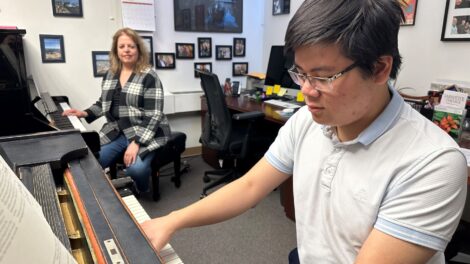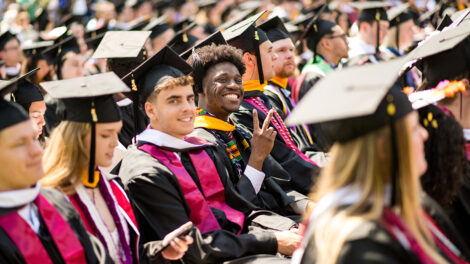A year of musical explorations
By Bryan Hay
Students sleepily filed into Prof. Anthony Cummings’ FYS on an October morning, encountering a bespectacled, bearded man with sweptback gray hair. He seemed to have appeared from another time and place.
After exchanging wary glances, the class quickly warmed up to the guest’s transatlantic accent and baritone cadences that carried the topic of the day, the Franco-Flemish school of music of the 15th and 16th centuries, one of the most fruitful periods of western classical music, and composer Josquin Desprez in particular.
Smiling radiantly, Joshua Rifkin, the fabled American musicologist, was about to take them on a journey of sound and historical exploration as Cummings made clear the educational gift they were about to receive, introducing their guest as “the most distinguished member of my profession.”
For the entire academic year, Rifkin charmed, taught, stimulated, inspired, and entertained students, faculty, staff, and campus guests as Lafayette’s Wendy and Alan Pesky ’56 Visiting Artist-in-Residence in honor of the 40th anniversary of Williams Center for the Arts.
A Juilliard- and Princeton-trained musicologist, conductor, performer, scholar, and professor of musicology and ethnomusicology at Boston University, Rifkin is widely known for reviving interest in ragtime composer Scott Joplin and reimagining the accepted performance practice of J.S. Bach’s choral works.
During his yearlong residency, arranged by Cummings, Eugene H. Clapp II ’36 and Maud Millicent Clapp Professor of Music, Rifkin followed an exhausting pace to make the most of his time at Lafayette.
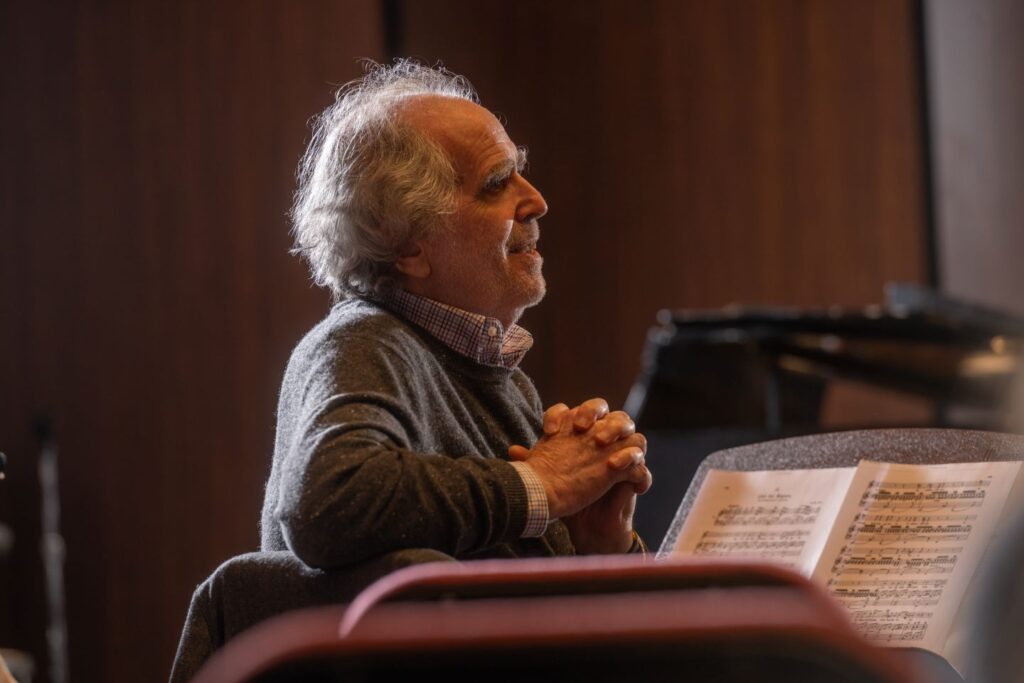
Joshua Rifkin enjoys a master class held for Lafayette voice students
He visited classrooms to discuss music; participated in a Music Department-sponsored symposium with panelists from around the world on Felix Mendelssohn’s revision of J.S. Bach’s St. Matthew Passion; staffed a master class for four of the College’s most accomplished student vocalists with another distinguished visiting artist, tenor Frank Kelley; conducted an open rehearsal before one of his performances; joined the Williams Center Performance Series as piano accompanist with Kelley on Schubert’s song cycle Die schöne Müllerin; worked with Lewis Baratz on assisting members of the orchestra further develop their expertise as instrumentalists; and taught private lessons on piano.
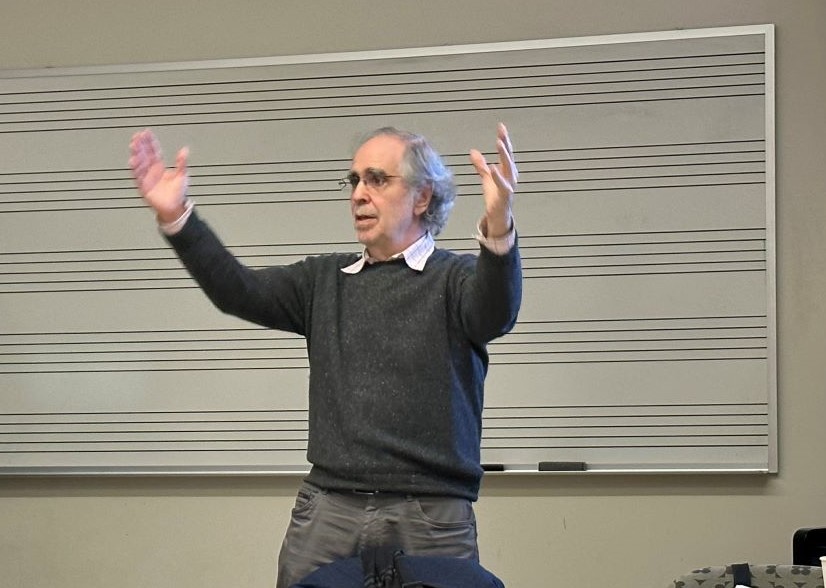
Joshua Rifkin inspired students during his classroom presentations
On that October morning, Rifkin awakened the class to the transcendent beauty of Desprez, first playing a recording of perhaps his greatest Marian motet, “Ave Maria, Virgo Serena,” and then dissecting its text and strophic structure.
“How does it make you feel? How do you respond to what you just heard?” Rifkin probed.
Clearly moved by the early music, Maxwell Wagner ’27 slowly lifted his head and turned toward Rifkin.
“It’s divine, as if seeing God in heaven,” he said measuredly, almost levitating in his revelation. Rifkin grinned. He knew his teaching goal was more than fulfilled on this day.
“A lovely image,” he replied. “Desprez would have been flattered.”
In consideration of the residency and to honor the Pesky family, Cummings wanted someone of international stature to inspire students just as Rifkin did with introducing Desprez to young but accepting ears.
“And because it was the anniversary of important developments in the Williams Center for the Arts Performance Series and the Max Kade Center and Max Kade Haus, which hosted Prof. Rifkin, I personally wanted to identify someone who embodied versatility and a wide range of talents and accomplishments,” he said. “No one better fulfills these objectives than Joshua Rifkin. He is a pianist, conductor, and musicologist of almost incomparable stature.”
During a conversation at the start of the fall semester, Rifkin described what he hoped to accomplish at Lafayette.
“You know, I’ve been around for a while. I know certain things. And I hope to be able to go in and do what we used to call my thing and hope that it will get across to students,” he said. “I’ll be able to sense whether they get it or don’t get it.
“I always hear very good things about the students here at Lafayette,” Rifkin added. “I have, shall I say, a great prejudice toward American liberal arts undergraduate colleges—my own daughter went to Amherst College—and I am a great fan of fine institutions such as Amherst and Lafayette where students just don’t sit back and assume a passive stance. They are smart, knowledgeable, know stuff, and ask the right questions.”
Rifkin predicted at the time that “we will have great fun together,” a self-fulfilling prognostication as the months ahead proved.
Derrin Lerner ’27 (chemical engineering) said Rifkin’s residency was important to Lafayette College because it brought an intellectual diversity to the classroom.
“I took Music 263 with Prof. Cummings this semester, and Prof. Rifkin visited my class twice,” he said. “Just as expected, his presentations in this class were really intriguing and fun.
“Having spent his years studying classical music and notable figures such as Bach and Josquin Desprez (the topics of his visits), he was able to delve deep into the lives of these figures, and also provide a deeper musical analysis,” he continued. “His well put together lectures clearly showed his passion for the music, and it bled into our understanding and interest as well. His true dedication is encouraging to all other studies, teaching that with passion, time, and effort, you can also become an expert of your own field.”
Wagner (biology and chemistry), who had his Desprez moment with Rifkin, noted that “despite our early morning tiredness, his particular expertise helped me gain a better understanding of the class on Renaissance music and helped me out quite a bit for my assignment regarding the Renaissance period.”
Master class
On April 3, Rifkin and Kelley served as jurors for a master class on the main stage at Williams Center as four of the College’s most promising vocalists, Christopher Taverner ’25, Bella Crapanzano ’26, Kailey Krausz ’24, and Michael Ragosa ’24, performed German lieder and Italian art songs as Tom DiGiovanni ’96 accompanied them on piano.
More mentors and coaches than jurors, Rifkin and Kelley, both longtime colleagues, adjusted each singer’s posture, vowel sounds, and diction, and stressed the importance of internalizing texts, vocal projection, stage presence, eye contact—all of the subtle yet important elements that can elevate a good performance to a memorable one.
“Go for more, conjure up an image from the text,” Rifkin imparted to Krausz, a soprano, who sang a song by Clara Schumann.
Afterward, she shared that she had spent a lot of time working on the Schumann, but the time spent with the two classical music veterans took the music to another level.
“It was such a great experience,” she said. “To be able to work with professionals giving advice that I wouldn’t have found otherwise and learning from such great musicians, it was so valuable. I learned how important text is in a song. It’s not just the music, but how the music interacts with the text, and how understanding the purpose of the song helps to bring forward the music and the meaning and effect to an audience.”
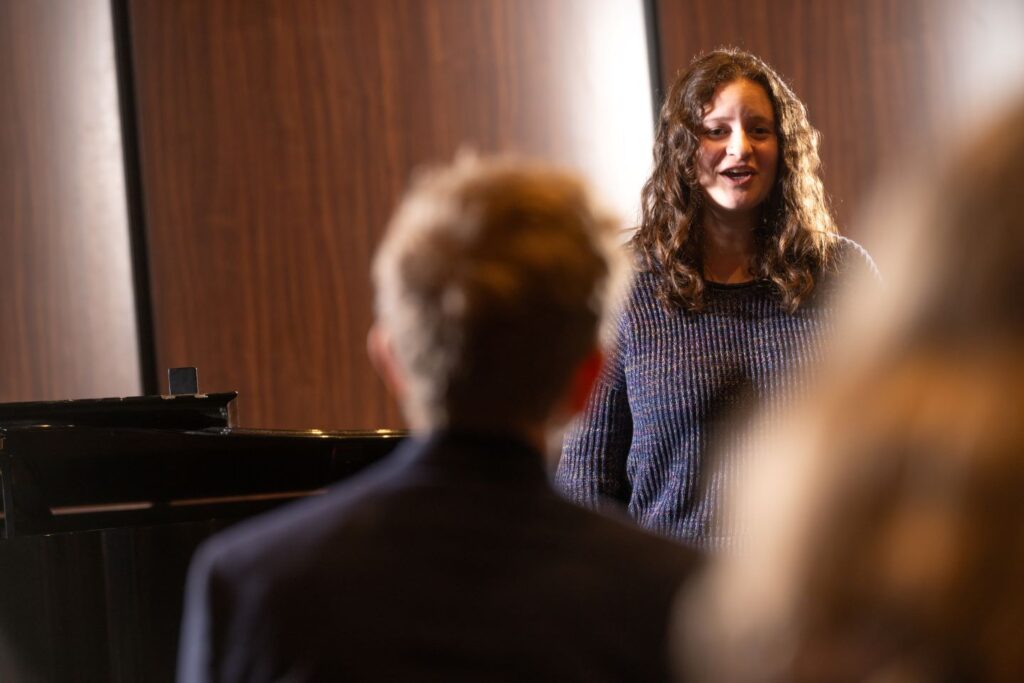
Soprano Kailey Krausz ’24 sings a piece by Clara Schumann during an April master class led by Joshua Rifkin and Frank Kelley.
Graduating on May 19 with degrees in music and civil engineering, Krausz said music was her first love and will continue to be part of her life as it informs her civil engineering side.
“They feed each other,” she observed. “The creativity that I’ve gained from doing music enhances the kind of design and other sorts of things I get to do in civil engineering.”
“Joshua greatly enriched and extended the College’s offerings in the performing arts in a way that exceeded our wildest expectations,” said Cummings, who enjoys a longstanding professional and personal relationship with Rifkin and attended the master class. “We were so fortunate and blessed to have him among us.”
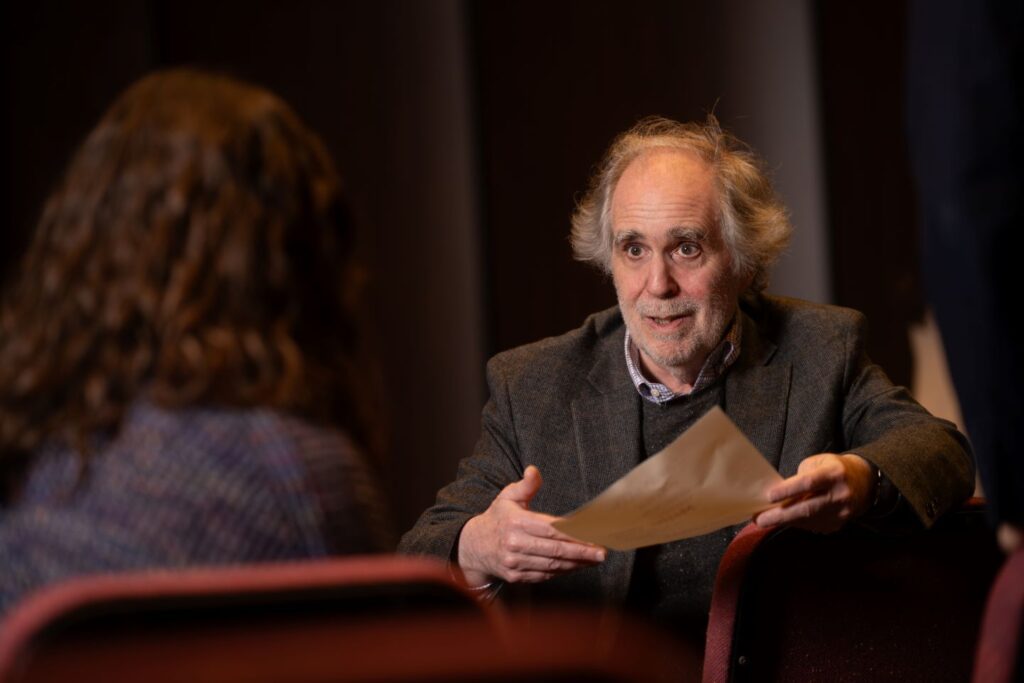
During master class, Joshua Rifkin offers helpful advice to soprano Kailey Krausz ’24
Later that evening, Rifkin met students, faculty, and audience members at an informal gathering at the Max Kade Haus. Still energetic and engaged in conversation after a full afternoon of master class coaching and the open rehearsal for the Schubert program the following evening, Rifkin reflected on his year at Lafayette.
“There’s just something so warm and inviting about this campus,” he said. “I don’t want to leave.”
